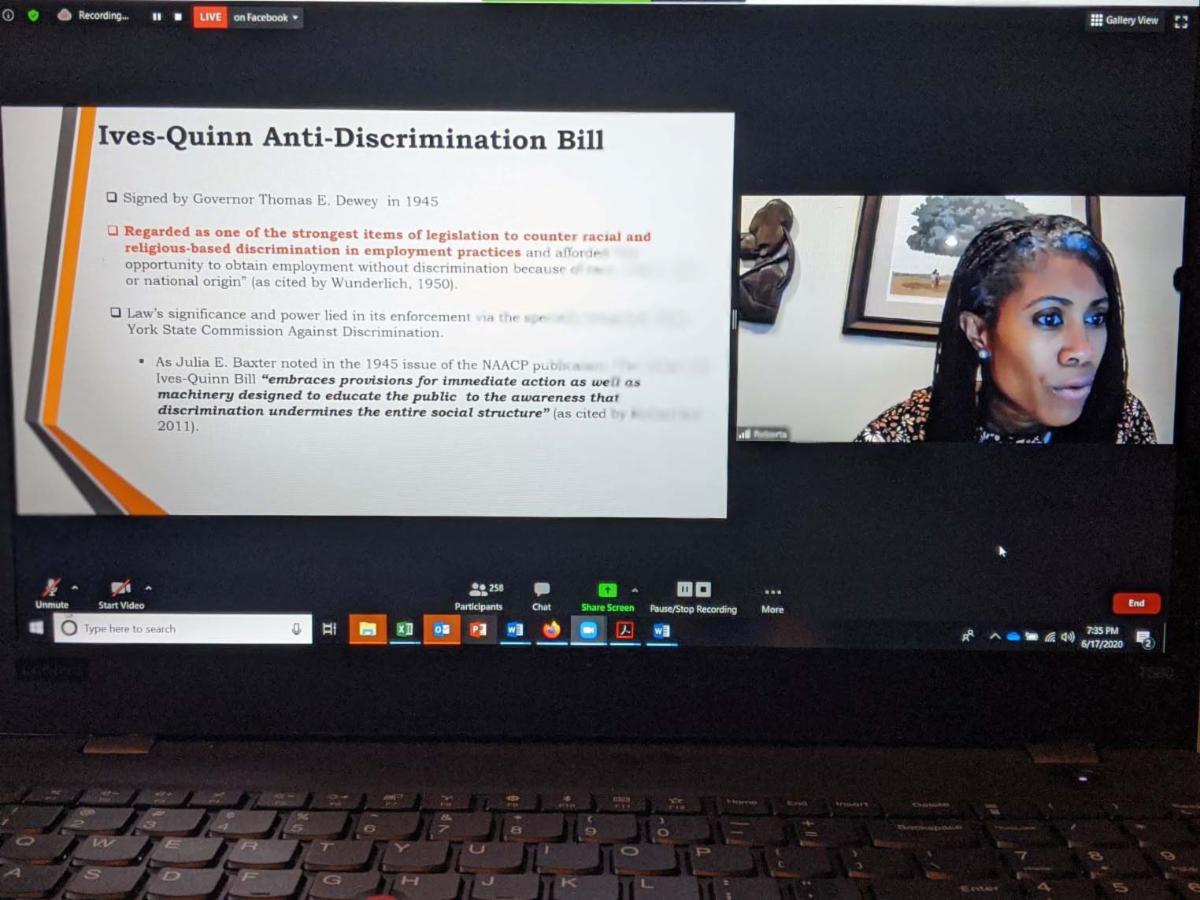|
|
|
|
|
|
|
Greetings from the NRC Aug 2020
15
|
Do you sometimes feel like the rhythm and punctuation in life is missing, along with the social interactions and order we previously took for granted? Like much in this COVID era, we are concurrently living this reality individually all across the country. But one of my favorite Osher directors points to some of the "beautiful incidentals" of these times for OLLIs: members who left their Institutes because of immobility returning online to past friendships; the joy of meeting someone new on Zoom you've never had the chance to meet at an in-person class; and, finding connections with long-distance experts or authors willing to engage with a class because time and distance boundaries are now immaterial.
There is a natural creativity that comes from difficult situations. And this month's Osher Institutes National Newsletter celebrates some of those beautiful and creative incidentals. But we also look at the ways OLLIs are helping members better understand the horrors and historic underpinnings of systemic racism and inequity. The forum we have within our Osher Institutes to make some sense of the complex and the irrational brings meaning and sometimes opportunities for personal action. This is another of those opportune times. We hope you find new meaning, ideas, and are inspired to creativity and action with some of what we have collected this month.
From our far-flung homes and summer retreats, the Osher NRC sends you gratitude and best wishes during these uncertain times. May you stay healthy and find comfort in our collective national community of lifelong learners.

Steve Thaxton, Executive Director

|
|
|
|

|
OLLI at University of South Carolina Beaufort
|
If you read this article's title and took a deep breath, this might be just the news you need to hear. OLLI's CAN thrive during a global pandemic. OLLI at the University of South Carolina Beaufort came to a screeching halt on March 16, in the middle of an active term with 1,831 members and 65 courses remaining in the term. A wise OLLI Director once shared, "It starts with the member. If you keep this simple yet profound philosophy in thought and action, a program can thrive."
 |
|
 |
OLLI member and instructor Katherine Brown enjoying Zoom coaching at her Beaufort, South Carolina home |
Over that first weekend when universities across the country transformed into ghost towns, those wise words shed light on our path forward. If we were feeling cut off from our institutions - how were
our members feeling
? OLLI is their educational community. For many, it is their lifeline for connectivity. With a sense of adventure, a can-do attitude and light on the path, we shifted very quickly to a virtual program using Zoom. As staff learned this new platform alongside early
adapter
volunteer instructors, 60 members tuned in to those first few March classes. That's less than 3% of membership.
Our focus shifted to the member's ability to adapt to a virtual platform.
Our members (median age 68+) had not experienced virtual learning.
Not every member is adventurous or an early adaptor. How would we get the majority of membership to try Zoom? One member at a time. Teach, coach, support, repeat. Weekly Zoom Bootcamp classes were offered with the assurance that they could not break the system learning the buttons and practicing. If it meant visiting a member's home and showing them (outside their window, of course) we were going to do it.
Patience and laughter are essential as members and staff work together to coach these new skills. Here are a few snippets from ZOOM trainings:
A 90-year-old OLLI member signed on to Zoom so she could practice with a staff member. They could hear her, but her video was grey. For 45 minutes staff tried to figure out what setting was off. Just as the training class ended, on a whim, the staff member asked her if she had anything taped to the frame of her computer monitor. Sure enough, she had a Post-it note that said "OLLI Zoom practice session tonight!" posted over the lens. Problem solved.
A member troubleshooting on why no one could see them in class, only hear them. Staff question - "Where is the camera on your computer?" Member answer - "The camera is still in the box..."
When testing a camera with member, staff says, "Wow, I like that picture hanging behind you." Member turns the testing session into a complete home tour.
Months later, OLLI at USCB is holding Zoom classes with over 260 members. Every day, serving one member at a time. The lesson we've learned, is keep the focus!
Submitted by
: Andrea Sisino, Director, OLLI at University of South Carolina Beaufort
|
OLLIs at University of California Riverside,
Berkshire Community College and University of Minnesota
Learning about Racial Inequity, Criminal Justice, and Black Lives Matter
|
Across the country, Osher Institutes are working to address the civil rights issues of our past and current affairs. Many Institutes seek to educate and inform their members on the numerous topics that are very present in our nation today. While others are offering classes, discussions, and seminars. The following are three samples on a variety of topics from the state of our criminal justice system and policing, to allyship with the Black Lives Matter movement.
OLLI at University of California, Riverside offers a course titled "Criminal Justice Issues in Review". This course addresses numerous aspects of the criminal justice system. As described in the course catalog, "This interactive course lets you experience the legal and criminal justice systems from the view of the judge's chair. A series of weekly topics and videos will lead to discussions of current and past legal issues, decisions, and consequences that affect our individual lives." This course is taught by Gary Bindman, JD, a practicing attorney who served on the bench of the Los Angeles Superior and Municipal Courts for more than 25 years.
 OLLI at Berkshire Community College has been very active in offering civil rights related content, including a recent discussion co-hosted with their local branch of the NAACP. The talk was titled "
The Policing of Black People in Public Spaces: An Old Trend That Legislation Has the Power to Stop." The event presented
"the historical framework surrounding the policing of black Americans in the United States; explore(d) the role of bias; and highlight(ed) how legislation can play a major part in addressing discriminatory behavior." The speaker for the event,
Roberta McCulloch-Dews,
is the Director of Administrative Services in the Office of the Mayor for the City of Pittsfield. A recording of the event can be viewed here. OLLI at Berkshire Community College has been very active in offering civil rights related content, including a recent discussion co-hosted with their local branch of the NAACP. The talk was titled "
The Policing of Black People in Public Spaces: An Old Trend That Legislation Has the Power to Stop." The event presented
"the historical framework surrounding the policing of black Americans in the United States; explore(d) the role of bias; and highlight(ed) how legislation can play a major part in addressing discriminatory behavior." The speaker for the event,
Roberta McCulloch-Dews,
is the Director of Administrative Services in the Office of the Mayor for the City of Pittsfield. A recording of the event can be viewed here.
 |
|
 |
Jael Kerandi |
OLLI at University of Minnesota recently offered a seminar titled "Allyship and How White Individuals and Non-Black POC Can Support the BLM Movement". This event was hosted by a nonprofit student group at the University of Minnesota, WE Charity MN and South Asians Against Racial Injustice. It is part of the ongoing Understanding Racial Injustice Speaker Series. One of the speakers was Jael Kerandi, the University of Minnesota's first Black Undergraduate Student Body President. As described, "Her recent letter to President Joan Gabel, called for the University to terminate its relationship with the Minneapolis Police Department." Past topics of the series included systemic racism, and the history of civil rights, among others.
These are just a sample of the many events, activities, and classes that OLLIs across the network are offering to their members. These issues, although often difficult to discuss are important and provide valuable content to members.
|
Osher National Resource Center
Top 15 Osher Institute Navigation Strategies
|
The Osher NRC has had countless conversations with OLLI staff and volunteer leaders during these pandemic months. With amazing resilience, 98% of Institutes pivoted quickly to online delivery and the continuation of their programs - just when older adult learners need safe social and intellectual engagement the most. Here are the top 15 effective practices presented as strategies for your own Osher Institutes to consider. Through the hard and creative work of your tireless peer leaders and host colleges and universities, there is much you can do to ensure your OLLIs success in these trying times.
- Take advantage of the free courses shared by other Osher Institutes to supplement your own
- Train your instructors in remote course delivery - confidence can be a big motivator
- Keep in touch with members - increase the frequency of communications highlighting the value of being an OLLI member
- If allowed, offer socially distanced outdoor activity options
- Use university resources - many host Institutions have enterprise accounts for applications or software, and can offer IT, marketing, library or other useful resources
- Market to lapsed OLLI members
- Train and ask volunteers or student workers to serve as online class assistants
- Appeal to members - membership fees and donations will keep their valued OLLI alive and well
- Build low-stakes Zoom practice sessions for members
- Host your catalog online instead of costly printing/mailing
- Keep asking - those who may have initially been reluctant to take or teach an online course may now be open to the idea
- Create a phone tree - a phone call can keep those without email involved and can be used to troubleshoot methods for continued participation in OLLI, even without online connectivity
- Don't undervalue what your Institute is offering by not charging fees - online engagement is valuable to older adult learners
- Offer virtual town halls or other events to bring together large groups and provide transparent information to the membership
- Bring a friend - the new member incentives that were used prior to the pandemic are still valid in remote formats
|
An Advice Column for Osher Institute Staff and Volunteers
 Dear Olli Dear Olli
|
 Dear Olli,
We have a few members asking about closed captioning services for our Zoom classes. We are exploring this possibility in both the live and the recorded versions. Do you have any recommendations?
~Helping Enhance Accessibility Resources
Dear HEAR,
Closed captioning is a great service to provide for your members! We do have a few recommendations to help you get started. First, check with your host institution. Universities and colleges typically have an office or department responsible for accessibility. This office should have recommendations for you, resources that the school uses, and potentially enterprise software/applications that you can use to provide closed captioning. Next, although Zoom does not offer a closed captioning service, it does allow for third party providers to "plug-in" to your Zoom account. These third-party providers range in cost and quality, it's best to research which one may work for you. Finally, many video hosting services have built-in closed captioning capabilities. The most popular, YouTube and Vimeo, both have built-in closed captioning. Although the steps are too long to review here, you can access this capability. Just be aware that the captions are not perfect and may require editing (which you can also do). I hope these options
sound like good starting places. I look forward to
hearing of your progress.
~Olli
Have a question for Olli? Please send it in care of Kevin Connaughton ([email protected]).
|
Quick Tips for Helping Operate an Osher Institute
 Quick Tip - Improving Racial Literacy in the Classroom Quick Tip - Improving Racial Literacy in the Classroom
|
While discussions of racism can often be uncomfortable, they are essential, and
 there are a variety of resources available to both classroom leaders and member participants to begin these conversations. Consider approaching various department heads on campus for resources, including but not limited to ethnic or gender studies units, diversity officers and Human Resources.
This article published by Inside Higher Ed highlights five ways college educators can have more effective conversations about race, noting that "
Talking about race as actions that people do helps establish common ground, foster a shared vocabulary and provide the opportunity to improve racial literacy."
|
|
| |
| |
|